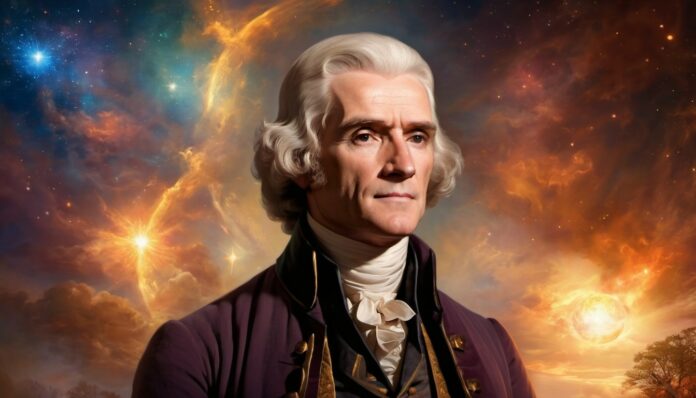Thomas Jefferson, born on April 13, 1743, in Virginia, was a Founding Father of the United States and the principal author of the Declaration of Independence in 1776. He served as the third President of the United States from 1801 to 1809. Jefferson was a Renaissance man known for his wide-ranging interests and intellectual pursuits.
He founded the University of Virginia, advocated for religious freedom, and expanded American territory through the Louisiana Purchase in 1803. Jefferson’s presidency was marked by his commitment to democratic principles, although he faced challenges such as the Embargo Act and conflicts with Britain and France.
He retired to Monticello, his plantation in Virginia, where he pursued his interests in science, architecture, and agriculture until his death on July 4, 1826.
Interesting Facts about Thomas Jefferson:
- Thomas Jefferson was born on April 13, 1743, in Shadwell, Virginia.
- He was the third of ten children born to Peter Jefferson and Jane Randolph.
- Jefferson attended the College of William and Mary and studied law.
- He was fluent in multiple languages, including French, Greek, Latin, and Italian.
- Jefferson was a skilled violinist and enjoyed playing music throughout his life.
- He served as the Governor of Virginia during the Revolutionary War.
- Jefferson was appointed as a delegate to the Second Continental Congress in 1775.
- He drafted the Declaration of Independence, which was adopted on July 4, 1776.
- Jefferson was known for his belief in individual rights and limited government.
- He authored the Virginia Statute for Religious Freedom in 1786, which inspired the First Amendment.
- Jefferson was Minister to France from 1785 to 1789, where he witnessed the French Revolution.
- He was the first U.S. Secretary of State under President George Washington.
- Jefferson founded the Democratic-Republican Party to oppose Alexander Hamilton’s Federalists.
- He narrowly defeated John Adams to become the third President of the United States in 1800.
- Jefferson was a strong supporter of westward expansion and commissioned the Lewis and Clark Expedition to explore the Louisiana Territory.
- He negotiated the Louisiana Purchase with France, doubling the size of the United States in 1803.
- Jefferson was an architect and designed his famous home, Monticello, as well as the Virginia State Capitol.
- He established the Library of Congress by donating his personal library after the British burned the original collection.
- Jefferson promoted public education and founded the University of Virginia in 1819.
- He was a proponent of agricultural innovation and experimented with new crops and farming techniques.
- Jefferson corresponded extensively with John Adams and they renewed their friendship in retirement.
- He was a wine connoisseur and introduced European grapevines to Virginia.
- Jefferson’s design for Monticello incorporated advanced technologies for heating and ventilation.
- He was a supporter of the abolition of slavery but owned slaves throughout his life.
- Jefferson enjoyed a lifelong interest in science and inventions, including a polygraph machine for copying letters.
- He was instrumental in establishing the decimal system of currency and the metric system in the United States.
- Jefferson kept detailed records of weather observations and agricultural yields at Monticello.
- He was a patron of the arts and amassed a significant collection of artwork and books.
- Jefferson died on July 4, 1826, the same day as John Adams, exactly fifty years after the signing of the Declaration of Independence.
- He is buried at Monticello, and his legacy as a statesman, philosopher, and visionary continues to influence American politics and culture.
